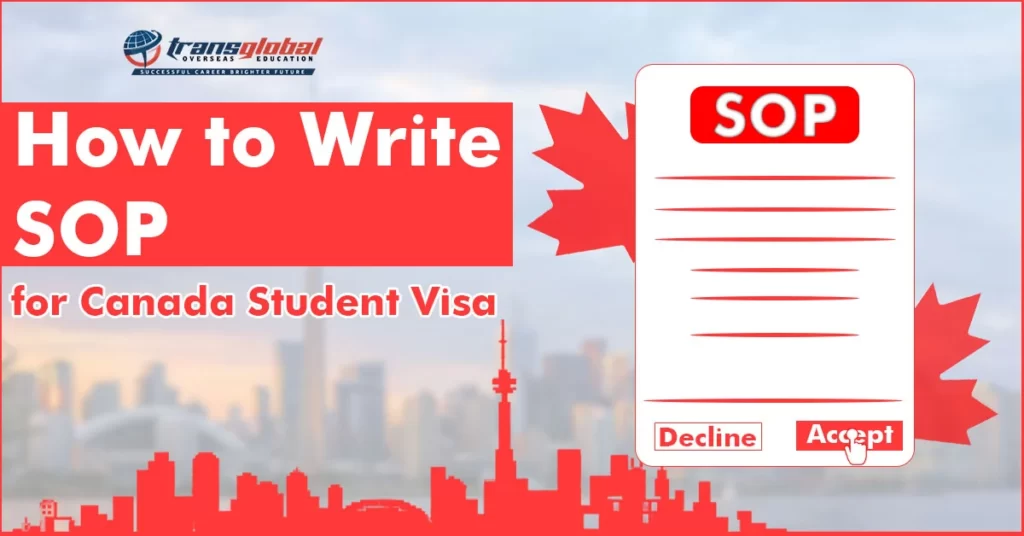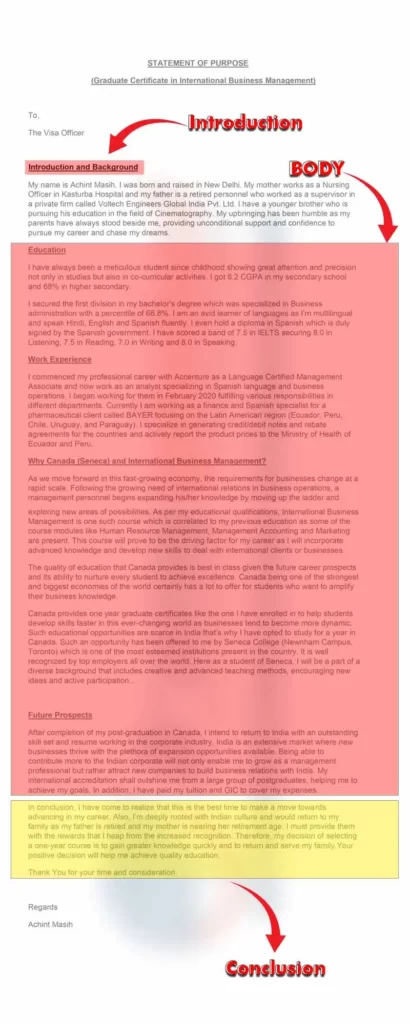
Canada has had over a million international students in recent years. Indian students formed the biggest community among international students in Canada between 2029 to 2023(1).
For Indian students applying to Canadian universities, it is very important to justify their candidature and ambitions for studying in Canada for a Visa or University SOP. A student’s expertise and professionalism in writing an SOP for canada study visa is very crucial in the final decision.
In this blog, you will learn about the right way to write the best SOP for a Canada student visa.
What is an SOP?
A Statement of Purpose is a critical official document that highlights your academic goals, qualifications, achievements and how you will perform in the university community to the admissions committee. A strong SOP can determine your selection and admission.
It is the only way to let the immigration officials know of your interests and goals in the specified program. An SOP for student visa is a document critical for evaluation at the embassy.
Why is An SOP for Canada Student Visa important?
An SOP is the only way to let the Immigration Officers evaluate your portfolio completely. Other reasons why an SOP for Canadian student Visa is important are:
- It is the only way to communicate your entire portfolio and to let the university know why you are a right match.
- It gives an overview of skills, professional achievements, experience, qualifications and academic potential that you need to study in the specified program. The SOP provides a platform to highlight your unique qualities, skills, experiences, and academic background.
- Letting the immigration officials know of your objectives, confidence and potential for success in the program is important for financing your student visa. Through the SOP, you can articulate your academic and career ambitions, detailing how your chosen program in Canada will contribute to your personal and professional growth.
- An SOP highlights your motivations, interests and critical thinking to help evaluate your potential and value for the study program.
- An SOP provides an honest account of your intentions and nature of your stay in the country.
- Financial Preparedness: You can provide details about your funding sources, such as scholarships, savings, or sponsorships, to assure the visa officer that you have the necessary financial resources to cover your tuition fees, living expenses, and any other associated costs.
- A crucial aspect of the SOP is highlighting your ties to your home country. It is essential to convince the visa officer that you have strong reasons to return to your home country after completing your studies in Canada.
Remember, crafting an impressive SOP that meets the requirements of the Canada student visa application can be a challenging task. But our overseas education consultants in Delhi help you present a strong SOP that lets you shine in your Canada student visa application. Contact us today to get started!
Different Types of SOP
There are two main types of SOP:
- Canada SOP for Student Visa: It is a document for evaluation sent to immigration centers. It is important as it highlights all facts and personal information about you like your past achievements, family background and academic achievements. These facts are used for the final decision.
- SOP for University: This SOP highlights your plans, interests and motivations in the university. This tells the admission council if you are the right fit for the university and if you can add value to the program.
Guidelines for Writing SOP for Canada
Adhering to these guidelines will ensure that your SOP meets the requirements set by immigration authorities and presents your profile in the best possible light. Some general guidelines include the following:
- Follow the specified word count and formatting guidelines.
- Use clear and concise language to convey your thoughts honestly.
- Address specific points mentioned in the application requirements, such as your educational background, study program choice, career goals, and ties to your home country.
- Be honest and authentic in your writing, avoiding exaggerated claims or false information.
- Write in grammatically correct language and mention your motivations.
How to Write SOP for Canada Student Visa in 2024?
Writing an SOP for a Canadian student visa requires careful planning and thoughtful execution. Here, we will provide you with a step-by-step guide on how to write SOP for a Canada study visa:
1st Step: Create an Outline
Organize your thoughts and ideas by creating an outline for your SOP. This will help you maintain a logical flow of information and ensure that all key aspects are covered.
2nd Step: Introduction
Start with a captivating opening paragraph to show your intellectual potential.
Introduce yourself, including your name, educational background, and the program you wish to pursue in Canada.
Clearly state the purpose of your SOP and express your enthusiasm for studying in Canada.
3rd Step: Show your Academic Background
Discuss your academic journey so far, including your previous degrees, coursework, and any relevant academic achievements. Explain why you have chosen the particular program in Canada.
Highlight any specific research interests or projects you plan to pursue during your studies.
4th Step: Show your Career Aspirations
Describe your long-term career goals and how the Canadian education system can contribute to their realization.
5th Step: Conclusion
Write a conclusion that stands out and communicate yourself honestly right from the start.
6tth Step: Proofread and Edit
Carefully review your SOP for clarity, grammar, spelling, and coherence. Ensure it flows logically and is free from errors. Seek feedback from teachers, mentors, or native English speakers to improve the quality of your writing.
SOP Format for Canada student visa
When it comes to formatting your SOP for a Canada student visa, it’s essential to follow the specific guidelines provided by the university or immigration authorities. While the exact format may vary, here are some general guidelines on the SOP format for a Canada student visa:
Introduction
Begin your SOP with a strong, concise and facts on point. Clearly state your enthusiasm and intention for pursuing education in Canada. Capture the reader’s attention by sharing a compelling story, personal anecdote, or inspiring quote related to your field of study. Maintain a tone that should discuss your past and future developments.
Academic Background
Share information about your educational journey; highlight specific courses or subjects that have influenced your decision to pursue higher education in Canada.
Professional Background
Talk about any career goals that influenced your decision to study abroad. Link your work and skills with the program in an intelligent manner.
Why This Program?
Explain why the program can be effective and what you can achieve with the studies. Talk about the key points of your investigation of the program. Mention how it aligned with your goals and highlight the factors that influenced your decision in close detail. Highlights the modules and facilities that grabbed your attention.
Why The University?
Clearly communicate the reasons why the university is fit for your ambitions and how it stands out. Mention facts and achievements of the university that were central to your decision.
Reasons for Choosing Canada
Explain how studying in Canada will give you the right education and skills. Mention advantages of studying in Canada and your preferences for local facilities. Discuss Canada’s reputation for quality education, research opportunities, and multicultural environment. Emphasize any specific factors that attracted you to Canadian institutions.
Post Graduation Plans
Clearly articulate your short-term and long-term career goals. Explain how studying in Canada will help you to achieve those goals. Discuss how the specific program and university align with your career aspirations.
Ties to Your Home Country
Discuss your ties to your home country and your commitment to returning after completing your studies in Canada. Emphasize how your education abroad will benefit your community, contribute to the development of your country, or facilitate cross-cultural exchange.
Conclusion
End your SOP with a strong conclusion that summarizes your key points and reiterates your enthusiasm for studying in Canada. Express your gratitude for the opportunity to present your application and convey your readiness to contribute to the academic and cultural fabric of Canada.
Sample SOP for Canada Student Visa
Present yourself as an ambitious intellectual and communicate openly. Here is a sample SOP for Canada student visa that might help you:

Writing Tips and Best Practices for SOP
To enhance the quality of your SOP, consider the following tips and best practices:
- Present your true self confidently and showcase your unique strengths, achievements and past experiences. Craft your SOP in an engaging, interesting and honest tone about your qualities, skills, goals and qualifications.
- Use simple, straightforward, honest and concise language. Avoid excessive jargon or complex terminology that might confuse the reader.
- Provide specific examples, motivations, goals and researched points to illustrate your points and make your SOP more engaging.
- Pay attention to grammar, punctuation, and spelling. Mistakes in your writing can create a negative impression.
- Seek feedback from professors, mentors, or educational consultants to get valuable insights and suggestions for improvement.
Conclusion: How to Write SOP for Canada Student Visa?
Writing an SOP for a Canada student visa is a crucial step in your journey toward studying in Canada. It allows you to convey your motivations, aspirations, and qualifications to immigration authorities. By following the guidelines and tips provided in this guide, you’ll learn how to write a successful SOP for a Canada study visa that showcases your strengths, passion, and suitability for studying in Canada.
Contact our expert educational consultants today for personalized guidance that distinguishes you from other applicants. Let us help you understand how to write SOP for a Canada student visa and pave the way for a guaranteed and successful study abroad experience.
FAQs Regarding “How to Write SOP for Canada Study Visa”:
How is a Statement of Purpose for a Canadian Student Visa different from Other Countries?
Yes. The difference lies in the specific requirements and expectations of each country’s immigration authorities and educational institutions. The SOPs of Canada and other countries are largely the same, except for a few points. For Canada, it is essential to highlight your genuine interest in studying in Canada, academic goals, and your plans to contribute to Canadian society.
What Mistakes to Avoid When Writing SOP for Canada?
- Avoid using clichés and generic statements that do not provide honest insight into your individuality.
- Steer clear of grammatical and spelling errors by proofreading and editing your SOP meticulously.
- Avoid copying sample SOPs or using excessive quotations; maintain authenticity and originality.
- The SOP should be on point, honest, straightforward and communicative about your goals.
What is the word limit for Canada student SOP?
The word count for an SOP in Canada can vary depending on the institution and program requirements. Generally, it ranges from 500 to 1,000 words. It is crucial to adhere to the specified word limit and ensure that your SOP is concise, well-structured, and effectively communicates your key points.
Can I use the same SOP for multiple university applications in Canada?
No. Each University and program have unique structures, have different requirements and offer a unique curriculum. While it is tempting to reuse the same SOP for multiple universities, it is recommended to tailor your SOP to each institution and program. Take into account the unique features, strengths, and values of each university and align your SOP accordingly. This impression will bring out the value and potential in you, increasing your chances of acceptance.
Is SOP mandatory for Canadian Student Visa?
Yes. A SOP is mandatory for a Canadian Student Visa as it contains some of the most critical points that are factors for securing a student visa.
Is SOP for Canadian student visas different from SOP for universities?
While both involve writing about your academic goals and reasons for choosing a particular program, the focus differs:
- University SOP: Emphasizes your academic qualifications, research interests, and why you’re a good fit for the specific program and university.
- Visa SOP: Focuses on your intent to study in Canada, your financial stability, and your plans to return to your home country after completing your studies.
In essence, a university SOP is about convincing the admissions committee, while a visa SOP is about convincing the immigration officer.
How to write SOP for Canada after refusal?
Here are some key points to consider:
- Briefly mention the previous rejection.
- Explain how you’ve addressed the specific concerns raised by the visa officer.
- Support your claims with concrete evidence, such as updated documents or stronger ties to your home country.
- Clearly state your genuine intentions for studying in Canada and your plans for returning home.
What not to mention in an SOP?
Here are some things you should avoid mentioning in your SOP:
- Don’t express negative experiences you’ve faced. Instead, focus on your strengths and accomplishments.
- Be honest and truthful in your writing. Avoid making claims that are not supported by evidence.
- Keep your SOP focused on your academic goals and qualifications. Avoid expressing personal opinions or beliefs that are unrelated to your application.
- Avoid discussing sensitive topics such as religion, politics, or social issues, as they may be perceived as offensive or inappropriate.
- Avoid repeating the same information multiple times. Keep your SOP concise and to the point.
How should I address gaps in my education or work experience in my SOP for Canada?
Here are some strategies to consider:
- Acknowledge the gaps honestly and briefly explain the reasons behind them.
- Focus on the positive outcomes or experiences you gained during the gap. For example, if you took a break to travel or volunteer, discuss the skills you acquired or the cultural insights you gained.
- Show how the gap is relevant to your academic or career goals. For instance, if you took a break to gain work experience, explain how it has prepared you for your chosen field of study.
Explore more: How much gap is accepted for study in Canada?


